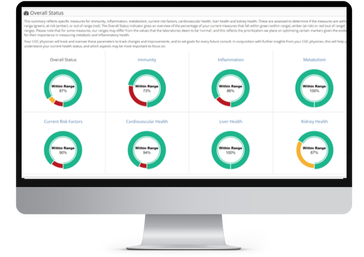The COC Protocol
Protocol Benefits
Multiple studies have shown the efficiency of a person’s metabolism may be a crucial factor in their cancer outcome. The COC Protocol is a metabolic cancer therapy that can be added to your standard-of-care treatments and is intended to:
- Help improve your response to standard-of-care therapies (chemotherapy, immunotherapy, hormonal, and radiotherapies)
- Reduce side effects from standard-of-care treatment.
- Enable a process called apoptosis, or “programmed cell death,” of cancer cells
- Return your body back to a healthy metabolic and inflammatory state following cancer treatment to help minimize recurrence.

Program Features
Results You Can Measure: While you’re enrolled in the program you’ll be able to visualize your progress through our new interactive digital platform (COC Health Insights) that shows you what you are doing well, where you’re at risk and what you need to improve.
Guided by Oncologists: Our program is delivered with oversight from experienced Metabolic Oncologists who can prescribe medications and other interventions to help improve your metabolic health.
Comprehensive Biomarker Testing: These tests look for specific metabolic and inflammatory markers that, if improved over time, lead to better health outcomes.
An In-Depth Health Report: A dynamic report informs you on your risk factors for cancer progression or recurrence based on your metabolic and immunologic functions. Quarterly check-ins will help us monitor and track your progress.
Protocol Medications: Care Oncology has patented protocol which uses medications designed to target the specific energy requirements of cancer cells, disrupting their ability to grow and multiply.
Lifestyle Recommendations: Your Care Oncology oncologist will make lifestyle recommendations (diet, sleep, stress, exercise) to help improve your biomarkers and overall health.
The History of The COC Protocol
Obesity, Diabetes, Chronic Inflammation and Insulin Resistance are known risk factors for the development of many cancers. Therefore, cancer patients at diagnosis may be at greater risk of already having or developing Metabolic Syndrome
Our Research in Glioblastoma
Care Oncology has conducted an internal analysis comprising 95 patients with a biopsy confirmed Glioblastoma IV brain tumour. Patients could be enrolled onto the adjunctive COC Protocol at any time i.e., from presentation of their GBM or at any future time-point if deemed eligible to receive treatment by the consulting COC oncologist. All patients continued to receive their standard of care treatments and follow up.
The primary endpoint was overall survival (defined as time from diagnosis until death from any cause).
- Mean age was 53.7 years
- Majority of patients were male [65 patients (68.4%)].
- Median time from diagnosis to starting the adjunctive COC protocol was 6.64 months.
- Cohort (n = 95) had a median survival of 26.3 months and a two-year survival of 55. 8%
GBM cohorts receiving optimal standard of care alone:
Median survival of 14.8 months in the Public Health England dataset (Brodbelt et al., 2015) and 15.8 months in a study by the European Organisation for Research and Treatment of Cancer (Stupp et al., 2005), with a 2-year survival of 28.7% and 26.5%, respectively.
The open-access perspective article in Frontiers in Pharmacology can be found here
Research on COC Protocol Medications
Many studies have demonstrated the potential utility of existing drugs in cancer metabolism, particularly in combination with existing standard-of-care therapies including chemotherapy, radiotherapy hormonal treatments and immunotherapies. The COC Protocol was derived from these studies after an exhaustive literature review, and in collaboration with senior academic oncologists, and comprises drugs that have:
- Mechanistic data supporting effects in cancer cell metabolism.
- Very large datasets showing effects in cancer cell metabolism.
- Human effects seen within current labelled dosage ranges.
- Been safely co-administered to cancer patients alongside conventional cancer treatments
Peer-reviewed literature suggests that each individual element of the COC Protocol may target cancer cell metabolism in a distinct and potentially complementary way. (Hanahan and Weinberg, 2000; Hanahan and Weinberg 2011; Bergers and Fendt, 2021).
What medications are included in the COC Protocol?
Below are some the medications we prescribe based on your individual cancer and health profile. Used in combination, these medications may help improve patients’ metabolic and inflammatory health in addition to lifestyle interventions.
Metformin: Along with ‘metabolically reprogramming’ cancer cells to make them potentially more vulnerable to standard of care treatments, metformin may also help to sensitize tumor response to standard therapies by: targeting generally harder to treat cancer stem cells, improving the hypoxic (low-oxygen) state which can often develop around tumors and which hinders the effectiveness of standard treatments, reversing multidrug resistance in cancer cells, and by beneficially modulating the tumor microenvironment (Tang et al, 2021, Jin et al, 2020).
Statins can improve the radiation sensitivity of cancer cells grown in the lab by increasing production of cell-damaging oxidative stress molecules (Hosseinimehr et al., 2020). Lab studies also show that statins can help reduce chemotherapy resistance in various different cancer cell types by targeting molecular processes in these cells- including blocking HMG-CoA reductase-dependent molecular pathways (Chen et al 2013, Chen et al, 2012).
Mebendazole may help to sensitize cancer cells to radiation therapy by increasing radiation-induced DNA damage. The drug can also work alongside chemotherapy drugs, overcoming cancer cell resistance (Guerini et al, 2019).
Doxycycline can help sensitize cancer cells to radiation by decreasing levels of a cell molecule called DNA-PK. Cancer cells are known to need this molecule for DNA repair, and it has been linked to radiation resistance in cancer cells (Lamb et al, 2015). Similar to metformin, doxycycline may also target cancer stem cells in low-oxygen areas that are resistant to traditional chemotherapies, and disrupt the molecular mechanisms that cancer cells use to produce energy (Tan et al, 2017 and De Francesco et al, 2017).
History of the COC Protocol
COC Protocol was developed by London-Based Care Oncology Clinic (COC) in 2013 and is based upon the work of German scientist Otto Warburg, who received a Nobel prize for his research on the unique cellular biology of cancer cell metabolism.
The COC Protocol is an individualized therapeutic approach to help lower the overall metabolic rate of cancer cells by simultaneously targeting multiple cancer pathways. This is accomplished through a specific combination of conventional pharmaceuticals which may work together to restrict the overall ability of cancer cells to take up and use (i.e., ‘metabolize’) energy.
Our New Program:
- Measures and tracks fundamental parameters, which if optimized, may improve cancer outcomes, and mitigate risks from treatment related toxicities. We evaluate these specific parameters via blood tests (biomarkers) and questionnaires, enabling provision of actionable insights to our patients based on their personalized scores.
- COC doctors carefully review patient data and make personalized, evidence-based recommendations to help drive improvements. This can include advice around diet and nutrition, stress, sleep, exercise, as well as the recommendation or prescription of a specific set of supplements with an excellent evidence-base in the cancer setting.
- In addition, the COC blood test data enables our clinical team to objectively assess the degree of metabolic control which may be being exercised by COC Protocol pharmaceuticals and to further refine the dosing of these over time.

